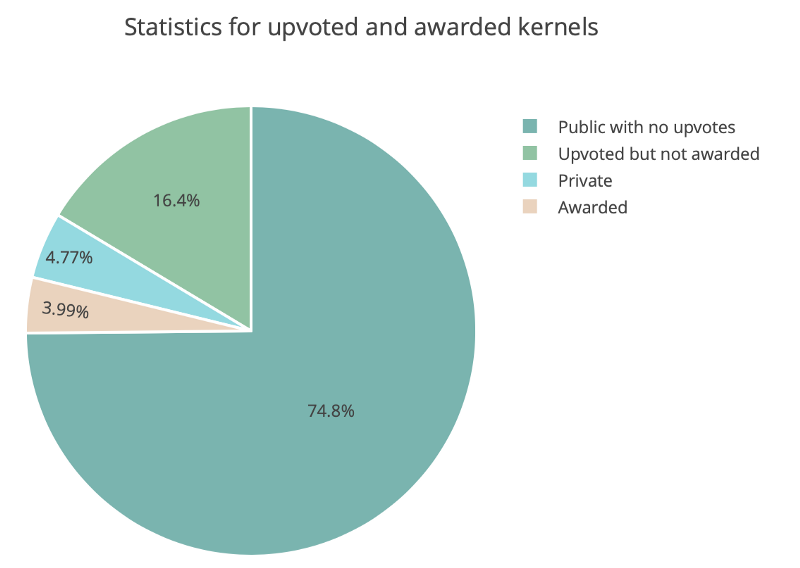How to get more upvotes/views on Kaggle
What is Kaggle?
Kaggle is the world’s largest data science community with powerful tools and resources to help you achieve your data science goals. Kaggle allows users to find and publish data sets, explore and build models in a web-based data-science environment, work with other data scientists and machine learning engineers, and enter competitions to solve data science challenges.
Do you know that most data scientists are only theorists and rarely get a chance to practice before being employed in the real-world?
Kaggle solves this problem by giving data science enthusiasts a platform to interact and compete in solving real-life problems. The experience you get on Kaggle is invaluable in preparing you to understand what goes into finding feasible solutions for big data.
Why is getting upvotes/views harder in Kaggle kernels?
From an analysis conducted on the Meta Kaggle dataset, it was found that there were more than 220,000 kernels on Kaggle in total, but only 20% of them were upvoted by Kaggle users, and only 4% are awarded, i.e having more than 5 upvotes.

This could potentially be due to the fact that Kaggle is a rapidly growing community of around 3 million people with over 19,000 public datasets, 170,000 forum posts, and 200,000 public notebooks to conquer any analysis in no time. Most Kaggle users are committed and it records over 4,000 forum posts per month and more than 3,500 competition submissions on a daily basis.
With such statistics, it is quite possible for the kernels to go unnoticed and it becomes even more difficult for novice Kagglers. Notebooks usually don’t get upvoted even after reading the kernel in its entirety and it could be due to some of the reasons such as:
- The notebooks weren’t interesting enough for the reader
- Maybe the quality of work is not satisfiable
- They had higher expectations from the kernel
- Or simply because the person already knew what you have done through the kernel, and thus the kernel did not offer any new insight or helped them learn anything new
- …
The majority of the kernels do not even get 1 upvote. This also makes the Kaggle Notebooks and Discussion sections challenging. If it were easy, where would be the fun?
Views and comments bring upvotes and to achieve them it becomes necessary to apply some unwritten rules of Kaggle which can help you to get more upvotes/views on Kaggle.
Tips and Tricks to get upvotes on Kaggle
As seen above, getting upvotes is difficult but not impossible. But with obvious and not so obvious growth hacks it can be a cakewalk. Let’s walk through each of the steps from the beginning.
Kaggle has 4 sections — Notebook(a.k.a Kernel), Discussion, Dataset, Competition
Let’s start with a Notebook:
While you are JUST making one:
- Keep the title catchy and clear. Attractive relevant titles grab more attention and people are enticed to click them.
- Tell compelling stories. it matters how the kernel material is presented through notebooks. The suggestion is to split up the code into small chunks with some accompanying text with images or memes to make things more clear. It does not have to be much, just 1–3 sentences explaining what, why, and how you’re going to address the next sub-problem. If you are using special packages or functions it would again be nice to just explain in a short sentence what the theory is behind it.
- Add the right and relevant tags
- Add an index to your notebook.
- At the end of the kernel, an author can ask the reader to upvote, comment, and share their views.
After you have done creating the notebook:
- More commits bring the kernel to the top of the kernel list, thereby rendering itself to users to check it out. Make sure to keep your notebook up to date.
- Write an article or blog around your notebook. Can add the link to your Kaggle notebook.
- Write a post on social media(LinkedIn, Twitter) and share.
- Share your work with the relevant community and ask their opinion. To gain upvotes from the users, the kernel needs to be shared with others, seen, and discussed. PLEASE DON’T BEG FOR UPVOTES. That’s shady!
Discussion:
Discussion is one of the highest rewarding activities and it builds true connections and followers. Let us share how discussion can help your Kaggle profile grow.
- Get involved in relevant discussions and share your work for reference wherever required. PLEASE DON’T RANDOMLY SPAM DISCUSSIONS.
- Be active in discussions and praise the notebooks you liked through relevant comments and upvotes.
Competition:
Ongoing/Live Kaggle competitions are the best and quickest way to get traction. Let’s see how
- Try to write on trending topics of the competitions OR trending topics applied to the competitions.
- Write about something which is Need of the hour w.r.t ongoing competition.
Dataset:
Sharing the public data with the community is always valuable and it is rewarding quickly.
- Scrap the data from the open sites, package it well and upload it for community use.
- Make sure to add all possible information related to Dataset usage and instruction, credits/source.
- Keep it updated.
- Create a task around the dataset so that Kagglers can be engaged.
- If possible, arrange a private or public competition to make it more engaging.
Miscellaneous:
- Active authors have more votes: try to be an active author and gain visibility, experience in writing kernels, and feedback from others will eventually help to get votes.
- Spend time looking at, upvoting, and commenting on other kernels that you like. Part of having your kernels noticed on Kaggle is being noticeable yourself by being an active contributor.
- Self-vote your kernel(okay this is cheap but…) because every vote counts and the more the votes, the more the chances of someone reading your notebook.
- Cross-promote the kernels with your connections.
Notebook/Kernel ideas
- Create a really helpful and popular kernel for an unpopular dataset and vice versa.
Unhealthy practices to avoid
- Don’t create multiple fake accounts to upvote the kernel.
- Don’t spam groups OR force people to upvote the kernels/discussion.
Well, all the points mentioned above can help you collect more votes but it won’t work if your work is not able to impart knowledge or provide value to others. So keep the quality at the core and the rest will follow.
If you like what we do and want to know more about our community 👥 then please consider sharing, following, and joining it. It is completely FREE.
Also, don’t forget to show your love ❤️ by clapping 👏 for this article and let us know your views 💬 in the comment.
Join here: https://blogs.colearninglounge.com/join-us
